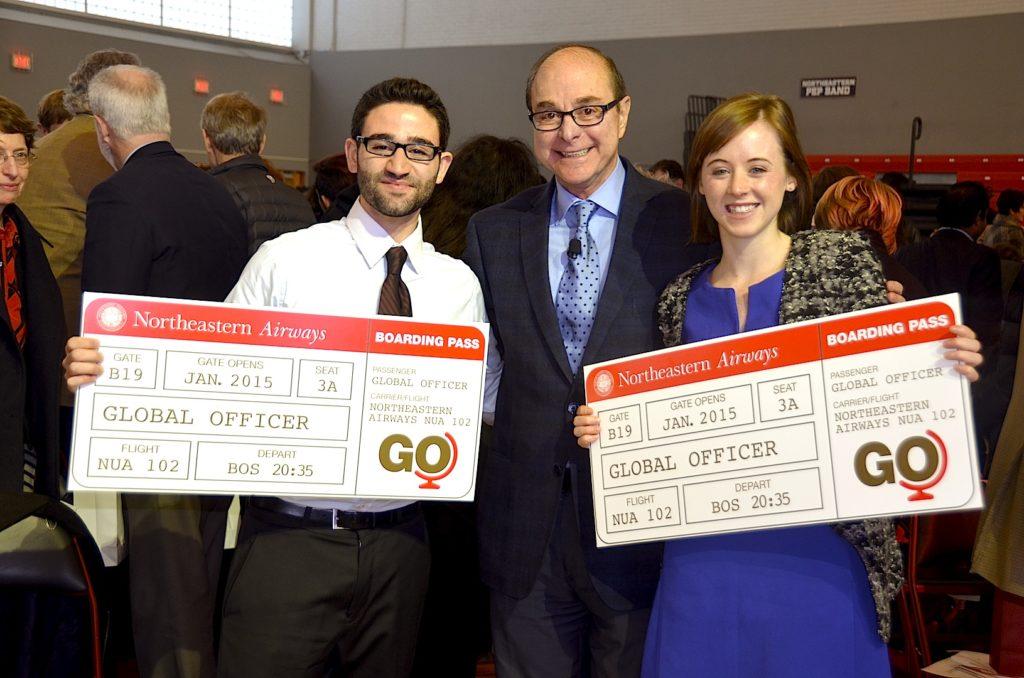By Ellyn Bailey, news correspondent
This Tuesday, a coalition of student activist groups on campus came together to air out their grievances with their university. At the event, The Real State of NU, in opposition to President Aoun’s annual State of Northeastern address, the Progressive Student Alliance (PSA), DivestNU, Students for Justice in Palestine (SJP) and NU Sexual Health Advocacy, Resources and Education (S.H.A.R.E.) created a list of demands they intend to deliver directly to the president.
“I’m really [expletive] fed up with my university,” Troy Neves, a third–year sociology and cultural anthropology combined major, said.
Neves is also an active member of PSA, a labor activism group on campus that has previously worked to unionize adjunct professors and dining hall workers. He expressed particular dissatisfaction with the way his tuition money was being spent and the way he was being treated as a student.
“We are literally customers,” Neves said. “I feel like I’m cashing in my degree.”
However, Rebecca Noyes, a junior political science and environmental science major who is also a member of PSA, was very optimistic about the outcome of Real State of NU.
“It’s really powerful to see all of these student groups coming together inthis event and building a more solid coalition,” Noyes said.
Noyes, who emceed the event, was one of many students who felt that Aoun’s annual State of NU speech “[didn’t] address the direct concerns of the students.”
Speakers from other groups spoke up as well, including Austin Williams, third-year environmental science major and co-director of DivestNU, who blasted the university’s ties to the fossil fuel industry.
“Northeastern claims to be the greenest university in America, yet we maintain up to $16 million of investments in the fossil fuel industry,” Williams said.
At the end, a comprehensive list of demands was compiled. It includes grievances with the way mental illness is dealt with at the University Health and Counseling Services center and the lack of unisex bathrooms for transgender students and visitors. Noyes, along with several other members of the coalition, made it expressly clear that this was just the beginning. She urged the audience to become more involved and even teased the Real State of NU, Part Two, which is scheduled for January.
The following day, Aoun hosted students and members of the faculty and staff to his State of the University address. The address is meant to inform the university community and the general public of Northeastern’s future plans, celebrate “unsung heroes” and, this year, to announce the recipients of Aoun’s “Global Officer” co-op position.
Caitlin Morelli, a junior political science and international affairs major, and Matthew Bilotti, a senior business administration, entrepreneurship & innovation major, were chosen as the Global Officers
Along with Provost Stephen Director, who spoke on the new science and engineering complex currently under construction, Aoun focused on the Global Officer position as well as the creation of a new committee to address the issues that are most prevalent with the university. Aoun primarily framed the committee as a means for the diverse opinions and common values within the school and community to be housed and addressed under one roof, the Social Impact Council.
Neves attended the university address and held many of the same opinions after hearing Aoun speak.
“I agree with President Aoun that we need to bring more voices to the table, but I think that the voices we need to prioritize are those of the most marginalized in our community,” he said.
In an email sent out to students on Nov. 7, the Office of the President urged students to add their voices to the agenda through social media by using the hashtag #stateofnu. Aoun and Director ultimately shied away from answering social media questions or had no period for questions, instead using the formation of the new committee to divert concerns and questions.
“As a student involved in organizing [PSA], I often feel very much disrespected and continually silenced by the administration,” Neves said. “We have never been able to meet with him or engage in open conversation or dialogue.”
Despite the lack of directly addressing and acknowledging the social media questions, Storify, a social media platform, hosted a platform compiling the tweets into various categories: lack of respect and resources for faculty and staff, gentrification & disrespect of the surrounding Roxbury, Fenway and Mission Hill communities, irresponsible investment, endowment and tuition spending, lack of diversity and inclusion of marginalized community members, lack of adequate sexual assault and mental health resources and reaction to the formation of the council.
“I think the school needs to address issues that people truly care about – faculty wages, sustainability policies, financial aid and where exactly our tuition dollars go,” Emily Kish, a third-year international affairs and history major, said. “The unfortunate thing is that Northeastern tends to focus on huge research projects, how tech-savvy the school is, awesome investments in projects that the general student body is unaware of and anything business [or] money related.”
Both Neves and Kish believe that change is possible only if the university moves from meeting behind closed doors and becomes a transparent and community-inclusive process, in addition to prioritizing people over profit.
“Generally, I really like Northeastern,” Kish said. “I chose this school for a reason, after all. I love the co-op program and the opportunities we have to go abroad. But I’ve seen first-hand how little the administration here actually cares about its students. It’s not encouraging, and it’s embarrassing when alumni bring up valid concerns and I just have to brush them aside for money’s sake.”
Photo by Kariman Abuljadayel















